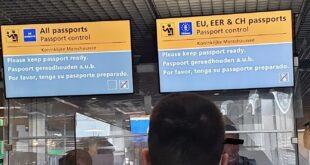Following a meeting in Brussels on Thursday, the interior ministers of European Union’s member states unanimously agreed to provide temporary protection to people fleeing the war in Ukraine.
Under the scheme, called the “Temporary Protection Directive”, refugees will have the right to live and work in the European Union for at least one year, a period that can be extended for additional two years.
These are the main features of the Directive:
- The protection will apply to Ukrainian nationals and their relatives, as well as to long-term residents from other countries who are unable to go back safely to their countries of origin.
- Short-term residents, such as seasonal workers and students, will not benefit from the temporary protection but will nevertheless be allowed to enter EU territory to plan their return trips back to their home countries.
- Refugees will be given residence permits to stay inside the bloc for at least one year. If the conflict continues, or refugees cannot return safely, that status could be extended for a further two years.
- Refugees are entitled to protection in any EU country, not only in the first country they reach
- Besides the legal right to stay inside an EU member state, the agreement enables access to the education system, labour market, healthcare, housing, professional assistance and social welfare.
- For those who fled their homes without their passports or any other means of personal identification, the European Commission says member states can relax border controls and allow them to enter their territory so they can reach a safe location, where the ID checks will be carried out.
- The temporary protection does not automatically mean the person is granted asylum. But those under the special scheme are able to lodge an asylum application at any time during their stay.
Thursday’s decision has been described as “historic” by Ylva Johansson, European Commissioner for Home Affairs, who praised the EU’s “unity” and “firmness” on the war in Ukraine.
“I’m proud of being European, I’m proud of the solidarity that individual citizens are showing” towards Ukraine, Johansson said at the end of the ministerial meeting.
Filippo Grandi, the UN High Commissioner for Refugees, has also welcomed the news, calling it “unprecedented”.
The “Temporary Protection Directive” is based on a law drawn up in the aftermath of the breakup of Yugoslavia in the 1990s to deal with large numbers of displaced persons arriving in the EU. However, it was never used until now.
As of Thursday, over 1 million people have fled Ukraine into neighbouring countries since Russia invaded the country on 24 February, according to the UN refugee agency UNHCR, which has warned that 4 million could leave the country in the coming weeks and months.
Sola Jolaoso
 THE AFRICAN COURIER. Reporting Africa and its Diaspora! The African Courier is an international magazine published in Germany to report on Africa and the Diaspora African experience. The first issue of the bimonthly magazine appeared on the newsstands on 15 February 1998. The African Courier is a communication forum for European-African political, economic and cultural exchanges, and a voice for Africa in Europe.
THE AFRICAN COURIER. Reporting Africa and its Diaspora! The African Courier is an international magazine published in Germany to report on Africa and the Diaspora African experience. The first issue of the bimonthly magazine appeared on the newsstands on 15 February 1998. The African Courier is a communication forum for European-African political, economic and cultural exchanges, and a voice for Africa in Europe.


































